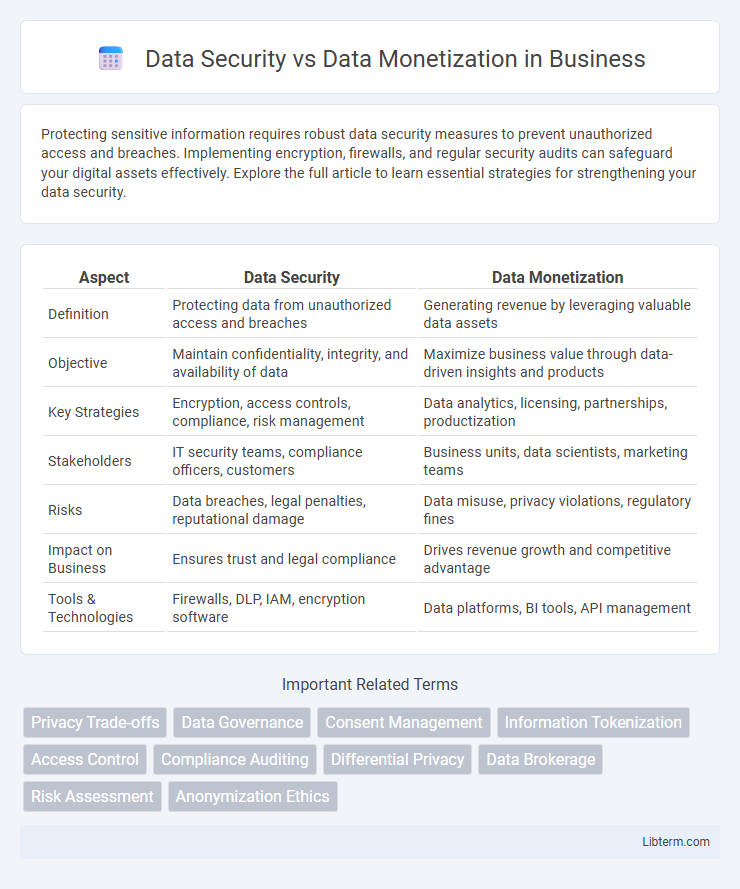Protecting sensitive information requires robust data security measures to prevent unauthorized access and breaches. Implementing encryption, firewalls, and regular security audits can safeguard your digital assets effectively. Explore the full article to learn essential strategies for strengthening your data security.
Table of Comparison
| Aspect | Data Security | Data Monetization |
|---|---|---|
| Definition | Protecting data from unauthorized access and breaches | Generating revenue by leveraging valuable data assets |
| Objective | Maintain confidentiality, integrity, and availability of data | Maximize business value through data-driven insights and products |
| Key Strategies | Encryption, access controls, compliance, risk management | Data analytics, licensing, partnerships, productization |
| Stakeholders | IT security teams, compliance officers, customers | Business units, data scientists, marketing teams |
| Risks | Data breaches, legal penalties, reputational damage | Data misuse, privacy violations, regulatory fines |
| Impact on Business | Ensures trust and legal compliance | Drives revenue growth and competitive advantage |
| Tools & Technologies | Firewalls, DLP, IAM, encryption software | Data platforms, BI tools, API management |
Introduction to Data Security and Data Monetization
Data security involves protecting digital information from unauthorized access, theft, or damage by implementing encryption, access controls, and secure networks. Data monetization refers to the process of generating economic value from available data through analytics, targeted advertising, or selling insights. Balancing data security and data monetization ensures organizations maximize value while maintaining compliance with regulations like GDPR and CCPA.
Defining Data Security: Core Principles
Data security encompasses the protection of digital information from unauthorized access, corruption, or theft by implementing principles such as confidentiality, integrity, and availability. These core principles ensure that sensitive data remains private, accurate, and accessible only to authorized users, safeguarding organizational assets and customer trust. Robust encryption methods, access controls, and regular security audits form the foundation of effective data security strategies.
Understanding Data Monetization: Key Concepts
Data monetization involves leveraging data assets to generate measurable economic value through strategies like direct sales, licensing, or enhanced business insights. Effective data monetization requires robust data governance frameworks to ensure compliance with privacy regulations such as GDPR and CCPA while maintaining data security. Balancing the extraction of business value with stringent data protection protocols is critical for sustainable monetization and customer trust.
Risks and Challenges in Data Security
Data security faces significant risks including data breaches, unauthorized access, and insider threats, which can result in financial losses and reputational damage. Securing sensitive information requires robust encryption, regular security audits, and strict access controls to prevent exploitation by cybercriminals. Balancing data monetization efforts with privacy laws such as GDPR and CCPA remains a complex challenge, as improper handling can lead to hefty fines and loss of customer trust.
Opportunities and Benefits of Data Monetization
Data monetization leverages organizational data assets to generate new revenue streams by transforming raw information into actionable insights and marketable products. Companies can unlock significant value through targeted advertising, personalized customer experiences, and strategic partnership opportunities, driving growth and competitive advantage. Effective data monetization balances data utilization with privacy compliance, ensuring trust while maximizing financial returns.
Regulatory Compliance: Balancing Security and Monetization
Regulatory compliance plays a crucial role in balancing data security and data monetization by mandating strict guidelines such as GDPR and CCPA to protect consumer privacy while enabling businesses to leverage data assets. Organizations must implement robust encryption, access controls, and audit trails to ensure data security and meet regulatory requirements, preventing costly breaches and penalties. Effective compliance frameworks allow companies to ethically monetize data through anonymization and consent management, optimizing revenue streams without compromising user trust.
Ethical Considerations: Privacy vs. Profit
Data security ensures the protection of personal information against unauthorized access, emphasizing user privacy and compliance with regulations like GDPR and CCPA. Data monetization involves leveraging data for financial gain, often raising ethical concerns about consensual usage and potential exploitation of sensitive information. Balancing these aspects requires transparent data practices that prioritize individual rights while enabling business innovation and value extraction.
Emerging Technologies Impacting Both Spheres
Emerging technologies such as blockchain, artificial intelligence (AI), and edge computing are significantly transforming data security and data monetization by enhancing encryption methods and enabling real-time analytics for value extraction. Blockchain's immutability strengthens data integrity while facilitating secure, transparent transactions that boost monetization strategies. AI-driven analytics optimize data utilization by identifying monetizable insights without compromising privacy, and edge computing reduces latency to protect sensitive information closer to data sources while unlocking new revenue streams through localized data processing.
Best Practices for Harmonizing Security and Monetization
Balancing data security and data monetization requires implementing robust encryption protocols while enabling secure data sharing through anonymization and tokenization techniques. Organizations must establish clear governance frameworks that define data access permissions and compliance with regulations such as GDPR and CCPA to minimize risks. Employing advanced analytics on secured datasets allows businesses to extract valuable insights without compromising privacy, achieving effective harmony between safeguarding data and generating revenue.
Future Trends: Converging Data Security with Data Monetization
Future trends in data management highlight the convergence of data security and data monetization, emphasizing the integration of advanced encryption techniques with real-time analytics to unlock value while safeguarding privacy. Emerging technologies like blockchain and federated learning enable secure data sharing and decentralized monetization models, fostering trust and compliance with evolving global regulations such as GDPR and CCPA. Organizations adopting these hybrid approaches can optimize data asset value without compromising security, driving innovation in sectors like finance, healthcare, and IoT.
Data Security Infographic

 libterm.com
libterm.com